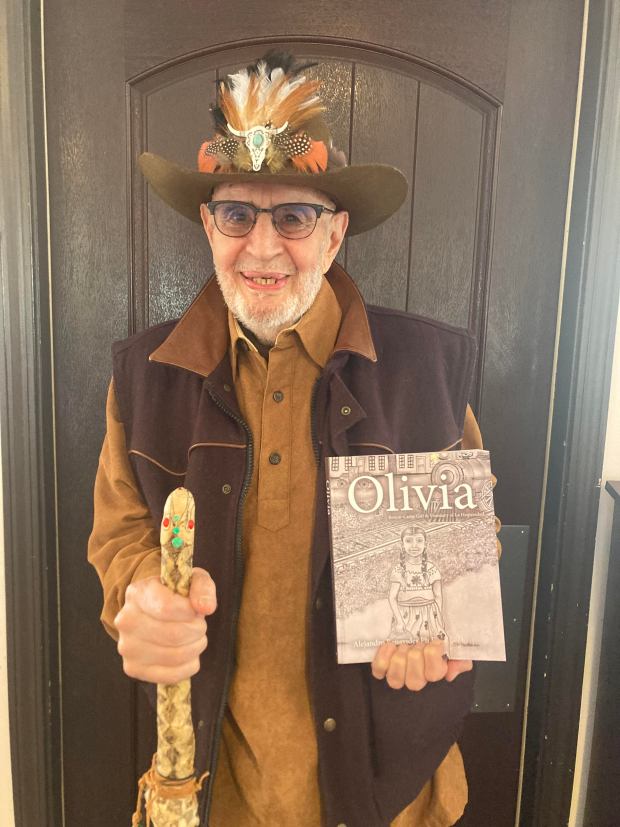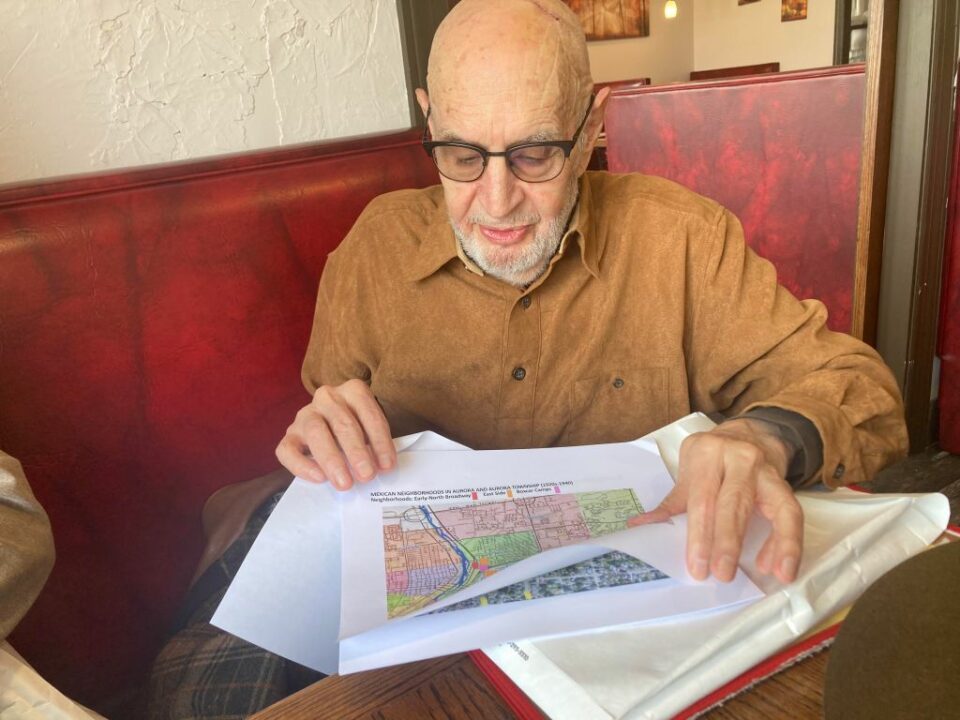[ad_1]
The first thing that intrigued me when Alejandro Benavides began telling me about his new book was its title.
“Olivia: Boxcar-Camp Girl & Visionary of La Hispanidad.”
So I asked the Aurora author and educator – who will turn 80 in a few months and describes himself as a lifelong learner – why he chose to tell the story of Mexican immigration in Aurora through the eyes of a little girl.
“Women in Mexico are the unsung heroes of the country, who held the families together, often fighting next to their husbands, yet facing massive gender inequality,” said Benavides, who came to Aurora from a Texas town close to the Mexican border in 1950.
So who better to represent the face of an immigrant population that has met with so many struggles while carving its place in the city’s history?
The book, released in February, chronicles Olivia’s life to the year 2000, starting when she arrived from Mexico with her family in 1927 to Aurora, where she lived in a boxcar camp that continued to expand as the Hispanic population grew.
“Olivia” is historical fiction, but Benavides, who poured years of research into it, insists more than 90% is based on facts and real people as it reveals the cultural differences and similarities within people of Mexican origin, as well as the roots of anti-Hispanic sentiment across the country.
And because Olivia’s story is woven into the lives of all Aurora working-class neighborhoods, it also delves into other cultures and how this diverse population molded the city’s past and impacts its future.
All of which places a lot of history on the shoulders of this young girl, whose story continues until she reaches her 80s and ends with a mysterious vision of “how Aurora would develop as a Hispanic tourist attraction.”
On page 317 – the book’s final – it reads: “The former Eola boxcar camp was designated a historical landmark; and a plaque was placed at the entrance to the former site.”
It could be said that Benavides, who holds a Ph.D. in education leadership and spent most of his career in special and general education administration, took the first step on Tuesday toward reaching that dream. That’s when he asked the Aurora Township Board to officially name the areas of those railroad settlements the “West Eola Mexican Boxcar Camp,” and the community close to it as the “Historical Austin-Western Immigrant Working Class Neighborhood.”
Benavides described this recognition as a “tribute to generations of working class immigrants and migrants who helped make Aurora a major railroad town and manufacturing center.” His talk included a detailed background of this movement, starting with the Anglo Americans to Aurora in the early 1830s, followed by decades of settlers, first from Germany and Luxembourg, and later, by immigrants from many other countries.
People from Mexico began arriving in Aurora during the late 1910s when it was a booming railroad town and manufacturing center, Benevides continued. The need for housing led to the railroad boxcar camp on McClure Road adjacent to the Austin-Western plant on Aurora’s eastern edge.
It is here, he said, where Mexicans established their own identity in the city while also maintaining their cultural traditions, language and religion. And it was the Austin-Western neighborhood where many moved after the boxcar camp closed in 1934.
Benavides gave a presentation in front of a group of seniors at this town meeting, who received his talk and the book well, said Aurora Township Supervisor Bill Catching.
“It is important that the township recognize the diverse history of our community,” said Catching, who guaranteed Benavides’ petition “will absolutely pass” at the next board meeting.
“The rich folks often get recognized for their influence,” he noted, “but those who built Aurora were the working class who are not acknowledged as often as they should be.”
Like Catching, Aurora Poet Laureate Emeritus Karen Christensen has a deep respect for the stories of this city’s immigrants, and told me Benavides did “an excellent job of combining historical fact with a compelling character we want to get to know better.”
The book, she went on, is not only an important story specific to Aurora but also is a “bigger purview” of our nation’s immigration, with segments that clearly spell out the anti-Hispanic sentiment, but also offer “a thought-provoking perspective” on ethnic relations in society.

“We have these nostalgic views about immigration in our country,” Christensen said, noting that’s true even when “talking about the boxcar community as part of the city’s Hispanic Heritage Celebration.”
Benavides’ book, Christensen said, “reminds us of how these places were not unlike refugee camps,” forcing us to step outside our bubble and feel the “day-to-day experiences of someone coming into our community who is viewed through a negative lens.”
Benavides described the book as a “Godsend to me,” because it helped him through the pain of 35-year-old son Reade’s heroin death in 2011, as well as his wife’s cancer diagnosis that led to her death in 2021.
He dedicated “Olivia” to his wife Anne Garcia Benavides, and to the students of East Aurora School District 131’s STEAM Academy that bears her entire name. As he also noted in this acknowledgment, his wife of 42 years is the first Hispanic woman in Illinois and the first Hispanic outside Chicago to have a public school named in her honor.
Benavides does not apologize for becoming emotional as he talks about her or his late son, whose struggles taught him that even “as an educator, there are some you cannot save.” And tears also gather in his eyes when describing how this writing project changed many of his beliefs.
It was not until Benavides finished the book and had time to reflect, “that I began to understand the whole story … I became Olivia,” he said, referring to how his growing spirituality, that included unexpected visions, ran parallel to his heroine, who eventually earned a Ph.D.
“It takes years for her to realize she has certain powers,” the author said. “But ultimately she realizes her real power is as a woman of education.”
Jim Pilmer, recently retired Fox Valley Park District executive director and another fan of local history, praised “Dr. Benavides for capturing the story of the authentic Mexican boxcar heritage.” And he encourages support for it, not only from the township but the entire Aurora community that has benefited from such a rich ethnic history.
Benavides suggests some might feel threatened by the Aurora in Olivia’s vision of what the city will look like in two generations. But as he points out, this vision of Aurora’s future is not just one of cultural diversity. It is one of prosperity for all.
“It is a story,” he said, “that ends on hope.”
dcrosby@tribpub.com
[ad_2]
Denise Crosby , 2024-04-14 13:00:34
Source link



